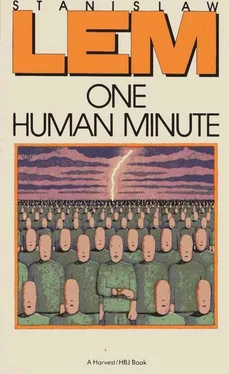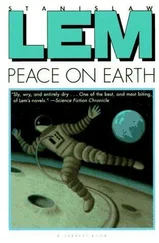The book is unmistakably authentic and fantastic — if, like me, you take “fantastic” to mean that which goes beyond the limit of our conceptions. Not everyone will agree with me, but I remain convinced that the poverty of today’s fantasy and science fiction lies in the fact that there is too little of the fantastic in it, in contrast to the reality that surrounds us. Thus, for example, it turns out that a person with his brain cut in two (there have been many such operations, especially on epileptics) both is and is not one individual. It happens that such a person, who appears completely normal, cannot put on trousers, because his right hand pulls them up while his left lowers them; or that he will embrace his wife with one arm while pushing her away with the other. It has been shown that in certain cases the right hemisphere of the brain does not know what the left sees and thinks; so it had to be acknowledged that the splitting of consciousness and even of personality had been achieved, that, in other words, two people existed in one body. But other experiments showed no such thing — not even that sometimes the individual would be single and sometimes double. The hypothesis that there were one and a half individuals, or two and something, also fell apart. This is no joke; the question of how many minds reside in such a person appears to have no answer, and this, indeed, is both real and fantastic. In this and only in this sense is One Human Minute fantastic.
Although each of us knows that on Earth all the seasons of the year, all climates, and all hours of the day and night exist together at every moment, we generally do not think about it. This commonplace, which every elementary-school student knows, or should know, somehow lies outside our awareness — perhaps because we do not know what to do with such an awareness. Every night, electrons, forced to lick the screens of our television sets with frenzied speed, show us the world chopped up and crammed into the Latest News, so we can learn what happened in China, in Scotland, in Italy, at the bottom of the sea, on Antarctica, and we believe that in fifteen minutes we have seen what has been going on in the whole world. Of course, we have not. The news cameras pierce the terrestrial globe in a few places: there, where an Important Politician descends the steps of his plane and with false sincerity shakes the hands of other Important Politicians; there, where a train has derailed — but not just any derailment will do, only one with cars twisted into spaghetti and people extracted piece by piece, because there are already too many minor catastrophes. In a word, the mass media skip everything that is not quintuplets, a coup d’état (best if accompanied by a respectable massacre), a papal visit, or a royal pregnancy. The gigantic, five-billion-human backdrop of these events exists for certain, and anybody who was asked would say, yes, of course he knows that millions of others exist; if he thinks about it, he might even arrive at the fact that with every breath he takes, so many children are born and so many people die. It is, nevertheless, a vague knowledge, no less abstract than the knowledge that, as I write this, an American probe stands immobile in the pale sun on Mars, and that on the Moon lie the wrecks of a couple of vehicles. The knowledge counts for nothing if it can be touched with a word but not experienced. One can experience only a microscopic droplet out of the sea of human destinies that surrounds us. In this respect a human being is not unlike an amoeba swimming in a drop of water, whose boundaries seem to be the boundaries of the world. The main difference, I would say, is not our intellectual superiority to the protozoon but the latter’s immortality: instead of dying it divides, thereby becoming its own, increasingly numerous family.
So the task the authors of One Human Minute set themselves did not look plausible. In effect, were I to tell someone who has not yet seen the book that it contains few words, that it is filled with tables of statistics and columns of numbers, he would look upon the undertaking as a flop, even as insanity. Because what can be done with hundreds of pages of statistics? What images, emotions, and experiences can thousands of numbers evoke in our heads? If the book did not exist, if it were not lying on my desk, I would say the concept was original, even striking, but unrealizable, like the idea that reading the Paris and New York telephone books would tell you something about the inhabitants of those cities. If One Human Minute were not here in front of me, I would believe it to be as unreadable as a list of telephone numbers or an almanac.
Consequently, the idea — to show sixty seconds in the lives of all the human beings who coexist with me — had to be worked out as if it were a plan for a major campaign. The original concept, though important, was not enough to ensure success. The best strategist is not the one who knows he must take the enemy by surprise, but the one who knows how to do it.
What transpires on Earth even during a single second, there is no way of knowing. In the face of such phenomena, the microscopic capacity of human consciousness is revealed — our consciousness, that boundless spirit which we claim sets us apart from the animals, those intellectual paupers capable of perceiving only their immediate surroundings. How my dog frets each time he sees me packing my suitcase, and how sorry I am that I cannot explain to him that there is no need for his dejection, for the whimpers that accompany me to the front gate. There is no way to tell him that I’ll be back tomorrow; with each parting he suffers the same martyrdom. But with us, it would seem, matters are quite different. We know what is, what can be; what we do not know, we can find out.
That is the consensus. Meanwhile, the modern world shows us at every step that consciousness is a very short blanket: it will cover a tiny bit but no more, and the problems we keep having with the world are more painful than a dog’s. Not possessing the gift of reflection, a dog does not know that he does not know, and does not understand that he understands nothing; we, on the other hand, are aware of both. If we behave otherwise, it is from stupidity, or else from self-deception, to preserve our peace of mind. You can have sympathy for one person, possibly for four, but eight hundred thousand is impossible. The numbers that we employ in such circumstances are cunning artificial limbs. They are like the cane a blind man uses; tapping the sidewalk keeps him from bumping into a wall, but no one will claim that with this cane he sees the whole richness of the world, or even the small fragment of it on his own street. So what are we to do with this poor, narrow consciousness of ours, to make it encompass what it cannot? What had to be done to present the one pan-human minute?
You will not learn everything at once, dear reader, but, glancing first at the table of contents and then at the respective headings, you will learn things that will take your breath away. A landscape composed not of mountains, rivers, and fields but of billions of human bodies will flash before you, as on a dark, stormy night a normal landscape is revealed when a flash of lightning rends the murk and you glimpse, for a fraction of a second, a vastness stretching toward all horizons. Though darkness sets in again, that image has now entered your memory, and you will not get rid of it. One can understand the visual part of this comparison, for who has not experienced a storm at night? But how can the world revealed by lightning be equated to a thousand statistical tables?
The device that the authors used is simple: the method of successive approximations. To demonstrate, let us take first, out of the two hundred chapters, the one devoted to death — or, rather, to dying.
Читать дальше












